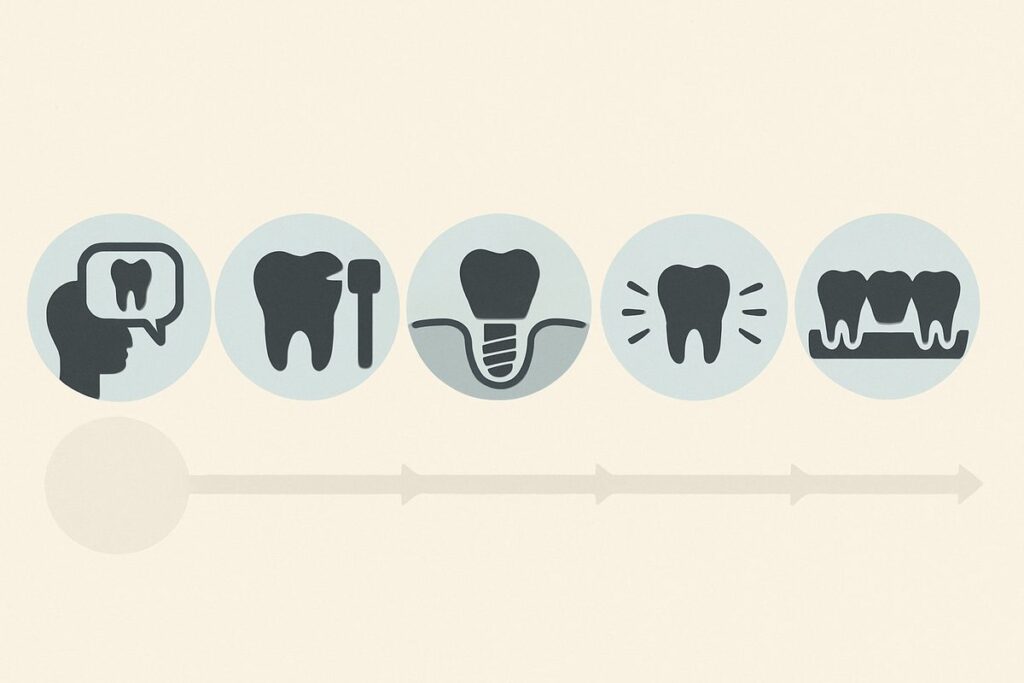
If you’re researching the steps to dental implants in Omaha, NE, this guide walks you through what to expect from the first visit to the final crown. You’ll learn who is a good candidate, why oral surgeons often place the implant post and abutment while your general dentist finishes the crown, and how modern imaging and pain control make the process safer and more predictable. This overview is for adults considering one or more implants to replace missing teeth or stabilize dentures.
Quick Overview: The Steps to Dental Implants in Omaha, NE
- Consultation & treatment planning with 3D imaging
- Preparatory treatments if needed (extractions, grafts)
- Implant surgery: placement of the post and sometimes the abutment
- Healing and osseointegration (3–6+ months)
- Final restoration placed by your general dentist or prosthodontist
Step 1 — Consultation & Treatment Planning
Your first visit focuses on a medical history, oral exam, and discussion of goals. For accurate planning, expect Cone Beam CT 3D imaging and iTero scans. These tools show bone volume, nerve locations, and tooth positions to guide precise implant placement. The consultation also covers costs, anesthesia options, and whether an oral surgeon will place the implant post and abutment.
What your first visit looks like
You’ll answer health questions, review X-rays or CBCT scans, and discuss timelines and fees. The team will explain options like single implants, multiple implants, or full-arch solutions. You’ll decide if the oral surgeon or a collaborative team approach is best for your case.
Step 2 — Preparatory Treatments (If Needed)
Some patients need extractions, bone grafts, or sinus lifts before implantation. If infection is present, antibiotics or tooth removal may be required. These procedures add weeks to months to the timeline but create a stable foundation. Your plan will note any staging so you know when implant placement can proceed.
Step 3 — Implant Surgery: Placing the Post & Abutment
Surgery day is typically outpatient. Sedation options include IV sedation or general anesthesia for comfort. Surgeons often use surgical guides made from scans to place the implant post precisely. In some cases the abutment is placed at the same time; in others it is delayed. Expect local swelling and mild discomfort after the procedure.
Pain control and recovery right after surgery
Surgeons use modern pain strategies like EXPAREL® to reduce post-op pain and limit opioid need. Over-the-counter pain meds, cold packs, soft foods, and rest are common early care steps. Follow-up checks ensure healing is progressing.
Step 4 — Healing & Osseointegration
Bone needs time to fuse to the implant—typically 3–6 months or longer. Normal signs include decreasing soreness, controlled swelling, and stable tissue around the site. Your surgeon will schedule follow-up visits and possibly a scan to confirm osseointegration before moving to restoration.
Step 5 — Final Restoration with Your General Dentist
Once healed, your oral surgeon transfers records and scan data to your general dentist or prosthodontist. They will take impressions or digital scans and place the crown, bridge, or denture onto the abutment. This final visit restores function and appearance and usually takes one or two appointments.
Typical Timeline, Costs, and What Can Change the Plan
Average timelines range from a few months for a simple implant to a year for complex cases requiring grafts. Costs vary with the number of implants, grafting, anesthesia, and restoration type. Check insurance, ask about financing, and get a written plan with itemized costs.
Choosing an Oral Surgeon for Implants Near Omaha, NE
Look for board certification, hospital privileges, advanced imaging, sedation options, and a history of collaborative care with general dentists. Midwest Oral Surgery & Dental Implants is a multi-doctor specialty practice serving Omaha, NE. Their surgeons, Dr. John Wewel and Dr. Jerome Wees, place implant posts and abutments and coordinate final restorations with local general dentists.
Bring a list of medications, any medical records, and your insurance information to your appointment. Prepare questions about timeline, anesthesia, and costs. Call or request a consultation to learn more about the steps to dental implants in Omaha, NE and to get a personalized treatment plan.
